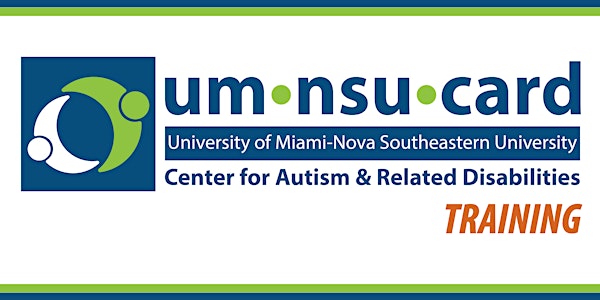
Issues in Autism Conference
Issues In Autism Conference. Genes, Brains, and More: A CARD Perspective on Autism Research and Community Engagement.
Date and time
Location
Online
About this event
Join us online for a very special conference featuring autism researchers and experts in the area of genetics, neuroscience, objective measurements of autism, virtual and augmented reality, clinic and classroom based interventions and more.
Please register with Eventbrite. For more information contact 954-262-7111 or card@nova.edu
Saturday April 3, 2021
Keynote Speaker Dr. Michael Alessandri, 9:00am
AUTISM 2021: Historical Highlights, Critical Challenges, and Promising Pathways
In this keynote address, the evolving study of autism spectrum disorder will be presented in an historical context as it relates to the presentations that follow. Transformative moments in our efforts to understand and better support those affected by autism will be discussed as will several critical challenges still requiring solutions. The presentation will end with a discussion of promising pathways forward for the diagnosis, treatment, and care of those with autism. Included among those hopes for the future are the truly game-changing community-based organizations, including the Florida Centers for Autism and Related Disabilities (CARD), designed to provide lifespan support and continuity of care to our fellow citizens with autism spectrum disorder, as well as the impactful research of our colleagues at the University of Miami who are working to transform lives through scientific inquiry and innovation.
AGENDA
10:00-10:30am
Dr. Melissa Hale: The SPARK Study: A National Autism Research Network
SPARK (Simon’s Foundation Powering Autism Research & Knowledge) is a landmark and the largest genetic autism study to date. The purpose of SPARK is to accelerate knowledge about autism by connecting individuals with autism and their families to researchers. This presentation provides an overview of the SPARK project and discusses the benefits that the project offers to individuals with ASD along with information about how to participate. We will also summarize key findings and share information about future directions and project goals.
10:30-11:15am
Dr. Daniel Messinger: Modern Measurement of Children with ASD: Lessons from the Clinic and the Classroom
Can technological advances like computer vision and machine learning teach us anything about children with ASD? In the clinic, objective measurements of movement and facial expression are associated with clinician ratings of autism symptoms. In the classroom, objective tracking of children’s movement and measurement of their speech shows that children with ASD learn language from speaking with their peers, but they speak with their peers less than neuro-typical peers. How do we harness these new findings to improve the lives of children with ASD in our community?
11:15am-12:00pm
Dr. Lucina Uddin: Network Neuroscience of Autism
Simple “under-connectivity” theories of autism have given way to more nuanced characterizations of the brain basis of disorder. Recent advances in network neuroscience have paved the way for these discoveries, introducing tools and conceptual frameworks that permit exploration of dynamic aspects of brain function. This section will review recent functional neuroimaging studies investigating brain connectivity in autism through a developmental lens. We will illustrate how analysis of brain dynamics can contribute to understanding flexible behaviors in autism and discuss some of the recent work parsing heterogeneity in neurodevelopmental disorders.
12:00-12:30pm
Cecilia Alvarez-Tabio: Evidence Based Practices in Coaching Parent and Teachers
In this presentation, the use of evidence-based practices in coaching will be discussed in two contexts: special education preschool classrooms as well as with parents of children with autism. This presentation will help understand the importance of involving teachers and parents early in the child’s development. Different coaching models that help develop social communication and play skills will be introduced.
12:30-1:15pm
Dr. Meaghan Parlade: Parent-Child Interaction Therapy for Children with Autism Spectrum Disorder
A significant number of children with autism spectrum disorder (ASD) present with comorbid behavior problems that many families feel underprepared to address. Parent-Child Interaction Therapy (PCIT) is one of the strongest evidenced-based treatment models for young neurotypical children ages 2 to 7 years with behavioral challenges. PCIT is unique with highly specified, step-by-step, live coaching sessions with both the caregiver and the child. A growing number of published PCIT studies have demonstrated positive outcomes with children with ASD (Parlade et al., 2019; Ginn et al., 2017; Zlomke et al., 2017). Research has shown that as a result of PCIT, caregivers learn more effective parenting skills that decrease child problem behaviors, improve children’s language, encourage child compliance, decrease parent stress, and improve the quality of the caregiver-child relationship. This presentation provides an overview of PCIT, the distinguishing features of this unique treatment model, and the evidence supporting its use with a variety of specialized populations, including ASD.
1:15-2:00pm
Dr. Anibal Gutierrez: Mixed Reality in Applied Behavior Analysis Intervention
This presentation will provide an overview of previous efforts to incorporate technology in the field of applied behavior analysis and also a preview of new projects to include Mixed Reality (Virtual and Augmented Reality) in applied behavior analysis intervention.
2:00-2:30pm
Silvia Gil: Building Community through the Autism Friendly Initiative
The presentation will provide the audience with an insight of how UM-NSU CARD is identifying limitations of inclusive opportunities and how this initiative has tackled such challenges. Strategies and resources are shared on how to successfully collaborate with community agencies and local businesses to build capacity for individuals with autism and related disabilities. Through this initiative UM-NSU CARD is creating inclusive communities as well as employment opportunities.
2:30-3:30
Autism Spectrum Disorder Speaker Panel Q&A
Speakers and autistic individuals will respond to prepared questions and respond to participant queries.
This conference has been approved for .65 ASHA CEUs.